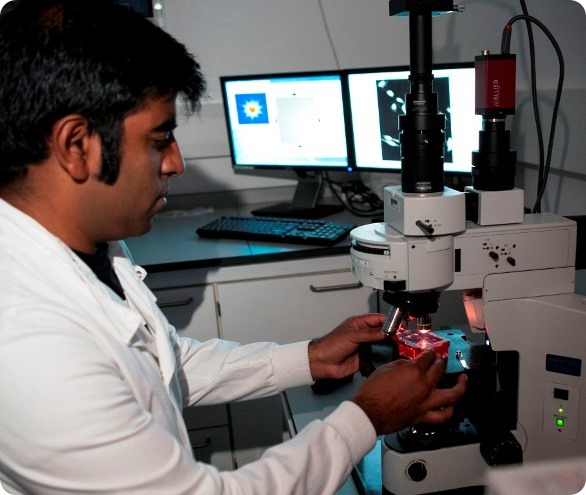Phase Focus Ltd (Phasefocus), the company that is revolutionising microscopy and imaging with the Phasefocus Virtual Lens®, announces the availability of the Virtual Lens series of label-free live cell imaging systems.

Dr Rakesh Suman, KTP Associate in the Imaging & Cytometry unit at the University of York using the Phasefocus Virtual Lens system.
Phase Focus Ltd (Phasefocus) announces a family of innovative phase microscopy systems for live cell imaging using the Phasefocus Virtual Lens®. The Virtual Lens, VL, acquisition and processing engine uses a technique known as ptychography, to provide quantitative, high contrast, label-free images of cells for long term time-lapse studies.
The use of fluorescent probes is commonplace for labelling fixed specimens. However, when used in living cells, these can be toxic and ultimately perturb the natural cell function. The use of laser illumination can also be phototoxic to cells. The Phasefocus VL20 upright and VL21 inverted live cell imaging systems use very low power laser illumination thereby enabling long term time-lapse cell imaging, including multi-area time-lapse, to produce high contrast quantitative image information.
In addition to this, the quantitative nature of the phase information means that data such as cell thickness, cell volume, and cell motility can be measured on a familiar and easy-to-use system for the study of both individual cells and cell populations.
The Virtual Lens is based on technology developed at the University of Sheffield by Professor John Rodenburg. It provides an iterative solution of the diffraction pattern phase problem and is applicable to visible light imaging, X-ray imaging and atomic resolution electron imaging. Phasefocus has applied the technology to develop and install two systems at the University of York in the Department of Biology as one of many technology-leading techniques in the Imaging and Cytometry group managed by Dr Peter O'Toole.
Dr O'Toole describes ptychography as "one of the most important breakthroughs in imaging. It addresses many of the fundamental problems inherent in current microscopy techniques. Put simply, what you get is more than what you see! Artefacts of sample preparation which may arise from labelling or use of markers are negated. I have been most impressed by Phasefocus and their ability to quickly respond to feedback and then to develop products to meet the needs of the user."
In conjunction with the development of the Virtual Lens, Phasefocus is supporting a KTP Associate at York, - Dr Rakesh Suman - who works in Dr O'Toole's group tutoring members of the department in the use of the technique for the study of many different sample types including cancer and stem cells and applications relating to immunology and neurology.
For more information on ptychography and its application for label-free, live cell imaging, please visit the Phasefocus web site: http://www.phasefocus.com/.